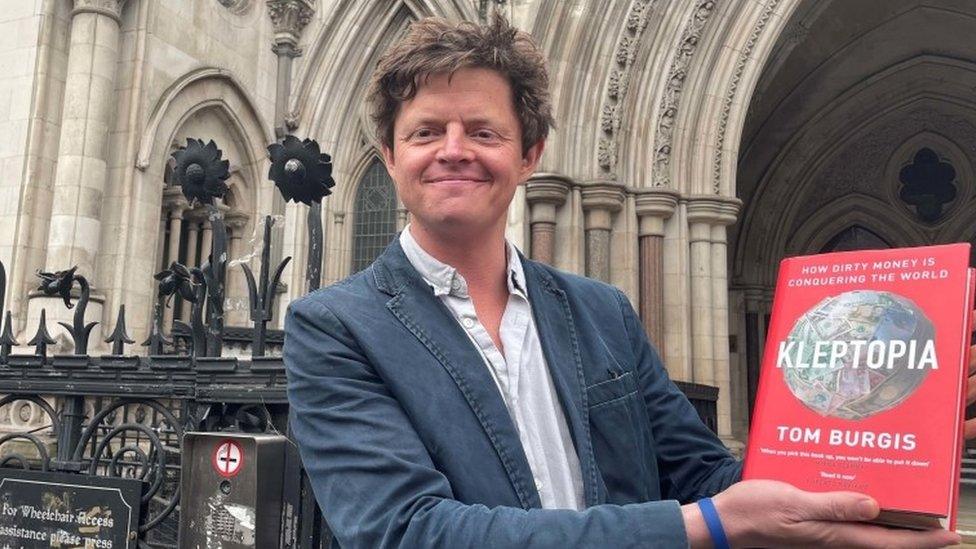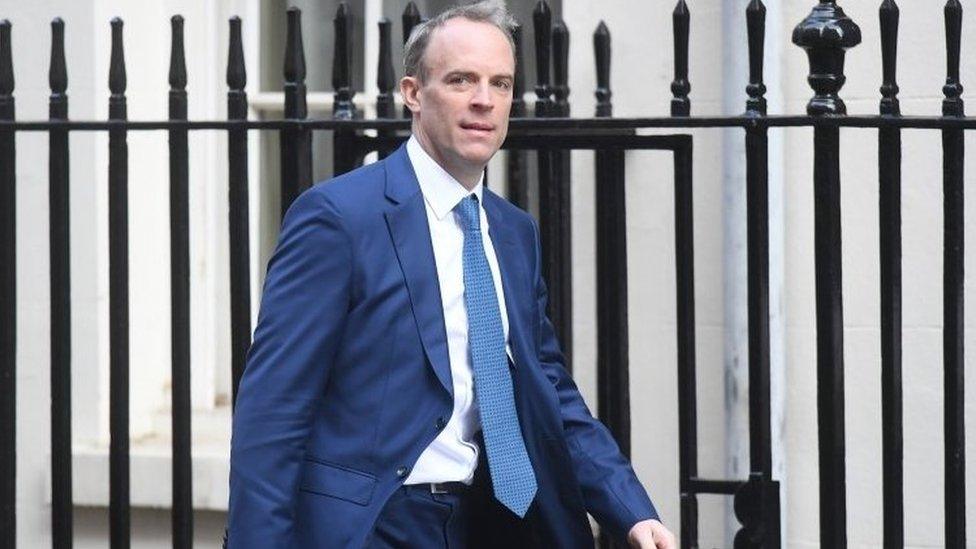UK vows to stop the super-rich using courts to silence critics
- Published

Journalist Tom Burgis faced potentially huge damages over his book, Kleptopia
The UK government has pledged to stop wealthy people such as Russian oligarchs "abusing" courts to silence critics.
The justice secretary has set out proposals to "protect our free press" and end the "bullying" of journalists.
Dominic Raab said the super-rich are increasingly using lawsuits to threaten those trying to expose wrongdoing.
Prime Minister Boris Johnson said the threat of legal action had become a "new kind of lawfare" for the rich.
The reforms were announced on Thursday after Labour called on the government to stop well-off individuals "gagging" the British media in the courts.
Labour leader Sir Keir Starmer suggested wealthy Russians with links to President Vladimir Putin may use gag lawsuits to avoid economic sanctions and criticism.
The UK government has been targeting such Russians with asset freezes and travel bans as part of its ongoing response to President Putin's war in Ukraine.
In Parliament, the legal reforms were welcomed by MPs, including Conservative Bob Seely, who said "we have allowed a corrupted cottage industry of legalised intimidation" to take root.
Labour shadow justice secretary Steve Reed said the government's proposals were "too little, too late" and asked how many Tory donors had used lawsuits to silence free speech.
He spoke after Mr Raab launched a consultation on plans to clamp down on so-called Strategic Lawsuits Against Public Participation, known as Slapps.
The Ministry of Justice said, external these lawsuits "involve wealthy people or large businesses using the threat of endless legal action and associated costs to pressure their opponents under defamation and privacy laws".
"This tactic is increasingly being used to intimidate journalists, authors and campaigners to stifle legitimate criticism and prevent the publication of critical stories and books," the ministry said.
Mr Raab said Slapps were a "burgeoning phenomenon" and that the estimated 14 cases seen last year were "the tip of the iceberg".
Two high-profile cases in recent months have brought the use of Slapps to wider attention.
One involved the author of Putin's People, journalist Catherine Belton, who faced five lawsuits brought by Russian oligarchs and firms. One of the lawsuits was filed by Roman Abramovich, who was sanctioned by the UK government last week.
Anther case involved Tom Burgis, author of Kleptopia: How Dirty Money Is Conquering the World.
In the book, Mr Burgis - a Financial Times journalist - charts how he says dirty money is linked to corruption and is now "flooding the global economy, emboldening dictators [and] poisoning democracies".
A libel claim brought by a Kazakh mining group that featured in the book was dismissed by the High Court earlier this month.
On Wednesday, Mr Burgis and Ms Belton told a committee of MPs how British courts were being used to intimidate journalists and protect powerful interests.
In a tweet, external, Mr Burgis welcomed the government's legal reforms, writing: "This is a big moment for the free press."
'Spurious claims'
The government said among the measures under consideration were changes to defamation law, to strengthen the public interest defence.
This is meant to protect those who publish private information in the interests of the public good.
The government is also considering capping the legal costs claimants can apply for, or requiring people who sue to prove "actual malice" in libel cases, in a bid to halt spurious claims.

Justice Secretary Dominic Raab will set out the reforms in parliament on Wednesday
Other measures could enable courts to throw out lawsuits seen to be using such tactics earlier on in proceedings, or impose bans preventing repeated legal challenges.
The government's consultation on the plans, which would affect courts in England and Wales, will close on 19 May, when the next steps will be announced.
Scotland and Northern Ireland have their own libel and defamation laws, which are also being reviewed.
'Chilling effect'
Prime Minister Johnson, a former journalist himself, said press freedom was "fundamental to our democracy".
"We must put a stop to its chilling effect," he said.
Mr Raab, who is also deputy prime minister, told MPs the reforms presented an opportunity "to put President Putin and his cronies on notice".
The reforms, he said, would "further strengthen free speech so that those with blood on their hands" are "no longer free to hide in the shadows".
The National Union of Journalists welcomed news of the consultation, adding it would consider the details of the government's proposals.
NUJ general secretary Michelle Stanistreet added: "For too long the super-rich have got away with abusing the law to bully journalists and undermine media freedom."
Dawn Alford, executive director of the Society of Editors, said it was "essential" laws were strengthened to ensure journalists, authors, campaigners and academics are "able to fulfil their role in keeping the public informed without fear of intimidation or harassment".